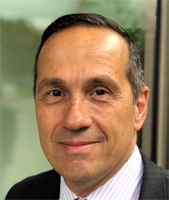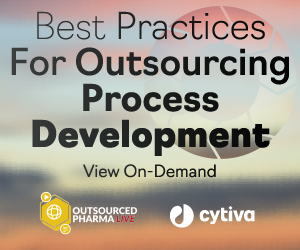CDMOs Won't Respect What You Don't Inspect

By Louis Garguilo, Chief Editor, Outsourced Pharma

“I learned the hard way,” says veteran biopharma executive, and current Senior Vice President CMC, QED Therapeutics, Rick Panicucci.
“Even the best of outsourcing facilities won’t respect what you don’t inspect.”
Months of COVID-19 lockdown could not dissuade him from living by his outsourcing canon.
“I truly believe it; thought long and hard about it. I use the phrase all the time. It’s just so fitting.”
Validating Through A Pandemic
QED Therapeutics, an affiliate of BridgeBio Pharma, is focused on precision medicine for fibroblast growth factor (FGF) driven diseases.
On June 1st, QED’s infigratinib (TRUSELTIQ) received FDA approval for patients with cholangiocarcinoma.
All validation activities for infigratinib were outsourced. Many of those needed to get accomplished during the COVID-19 lockdown months.
Follow us on LinkedIn ![LinkedIn]()
But Panicucci, who heads a lean but experienced CMC team we’ll learn more about subsequently, was not going to let the pandemic introduce further risk.
“Outsourcing itself is risky enough,” he says, despite overseeing the outsourcing of all development and manufacturing activities for all assets in QED’s pipeline.
While he’s learned some new things the last year or so, he made sure there’d be no need to re-learn his key tenet.
“When we were going through this process validation, we bought the facility,” he says.
“We said this is ours. We showed up every day. We let the CDMO know we're not stopping until we finish this. We were there on December 24th, December 26th. You need that level of dedication when outsourcing.”
 I should point out QED was not working with a large CDMO partner, and Panicucci and team had already established close working relationships with that service provider.
I should point out QED was not working with a large CDMO partner, and Panicucci and team had already established close working relationships with that service provider.
“That’s the other thing,” he says as an addendum to his inspect/respect mantra: “building personal relationships is a part of this.”
“I’m all over building relationships with our counterparts at the CDMO. I have to know the CEO – I know where they live,” he adds with a laugh. “I try to figure out what their spouses like … it just makes a big difference.”
“That’s because sometimes you will pick up the phone, and you're not going to be happy about something, and perhaps not use the best language. There has to be that high level of trust there.”
Panicucci says he does appreciate the expanded virtual avenues of communication the industry employed and improved upon as a result of COVID restrictions.
Nonetheless, he reminds me:
“We were in the middle of our product validation process – for both drug substance and drug product for infigratinib. There was no way in hell I'm going to trust any supplier on its own with that.”
Then adds:
“I’m glad we did get our suppliers, amidst COVID restrictions, to let us be there. If we hadn’t, it’s certain we would not be where we are today. You need at-location, and often extended discussions in real time, to stay on schedule.
“And it doesn't matter the partner. I’ve experienced working all over the place, and often CDMOs all do a good job. But sometimes they don’t and make mistakes. It doesn't matter where they're located, how much you’ve paid them, their experience; you just need to take full responsibility.
“That hasn’t changed, but it was harder to manage during COVID.”
Of that more difficult environment, Panacucci admits:
“The challenge of validating at a CDMO during COVID took several years off my life.”
What’s New
However, what helped him regain some of those years was “the biggest surprise as a result of pandemic adjustments”: the fully “virtual” writing of the NDA for infigratinib.
“We demonstrated we could write an NDA remotely,” he says.
“We were thinking we have to meet in person; everyone needs to communicate closely. My team was spread out across the U.S. The big question for us in March 2020 – as we were going into COVID shut down and had an NDA filing scheduled for August – was how, or even could we do this remotely.
“But the entire CMC team pulled this off, never meeting together. We’re talking thousands of pages of text, not to mention the batch records and everything else involved.
“That's something that shocked me,” Panicucci adds. “I think it’s the biggest learning. If you've got a really good team, you can even make this happen.
“We developed a methodology. You have to start with a secure, validated archiving system. You need to know who's working on a document, often simultaneously.
“I don't know how many times this has been done fully remotely, but I think 2020 may have produced a few of these.”
Panicucci believes that during the pandemic most of the industry improved on the overall managing of external partners.
“We had to up our game around communication, and that's certainly changed us a lot,” he says.
One area of change was in identifying potential partners.
“Learning about new suppliers via virtual audits and tours was quite a development for me,” Panicucci says. “We got good at this remote audit-and-tour routine.”
“Obviously, you can go through more introductory meetings remotely. That helps you pick the two or three CDMOs you want to visit. The initial selection process is more efficient. You can better ‘interview’ your potential partner, and for example, note who's on the Zoom call from their side.
“There's no excuse you can't also meet with the next layers of management and scientists. I say, ‘You sound like a really sharp person. Can I meet your direct reports, and some of their scientists?’ That helps you enhance your due diligence.”
“But when it comes to final selection of a CDMO,” Panicucci concludes, “you go and inspect.”
It’s a matter of respect.
---------
Also read:
Wanted: Right-Sized CDMOs For Advanced Therapy Developers
A Biopharma’s Guide To Staying Virtual Through Commercial


